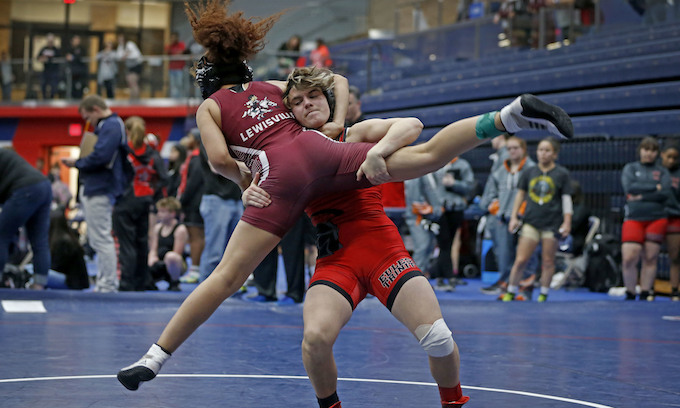The Republican-controlled Kentucky legislature voted Wednesday to override Gov. Andy Beshear’s veto of a bill to bar transgender student athletes from playing on girls’ sports teams, making it the sixth state this year and the 15th total to institute such a ban.
The Democratic governor last week vetoed Senate Bill 83, also know as the Fairness in Women’s Sports Act, stating in a letter that it “most likely” violates the equal protection rights of the Constitution as it discriminates against transgender students.
“More over, Senate Bill 83 bans transgender children from participating in girls’ or women’s sports without presenting a single instance in Kentucky of a child gaining a competitive advantage as a result of sex reassignment,” he said.
The bill had passed the state Senate 26-9 on March 24 after passing the House 70-23 earlier that month with the override passing the Senate 29-8 and the House 72-23 on Wednesday.
Secretary of State Michael Adams then signed S.B. 83 into law with Sen. Robby Mills telling reporters following the legislative session that Wednesday was “a good day for women’s sports.”
“It re-establishes the integrity of women’s sports in the state of Kentucky, both at the high school and middle school arenas and also at the collegiate arenas,” he said.
The bill was passed amid a state-level Republican push to ban transgender athletes from competing in women’s sports, though the effort has received pushback from Democrats as well as LGBTQ advocates and human and civil rights organizations.
The issue has become more prominent since Lia Thomas became the first openly transgender woman to win a NCAA Division 1 national championship when she took first place in the 500-yard freestyle last month.
The NCAA policy has a sport-by-sport approach to transgender participation that allows for that governing body of each sport to determine criteria while calling for transgender athletic participation.
Riley Gaines, a Kentucky University student athlete who tied Thomas for fifth in the NCAA 200-meter freestyle event, spoke in favor of the bill alongside Mills, stating that while she holds no ill will toward Thomas or any other transgender athlete, they should not be allowed to compete in women’s sports.
“We — and when I say we, I mean the majority of female athletes — want all people to be able to live as they choose and to be treated with respect. But we cannot ignore the biological and anatomical differences between males and females that are blatantly obvious,” she said.
Gaines argued that it is the responsibility of the NCAA to institute changes in order to keep women’s sports fair, stating that by allowing biologically born male athletes to switch to compete in women’s sports “is not only an infringement on female athletes but a mockery of Title 9,” a federal civil rights law that prohibits discrimination in schools based on gender.
“It is only a matter of time until one transgender athlete winning a national title turns into three and then into 10 and so on,” she said. “Transgender athletes should not be denied of athletic opportunities or success but they do not have a place in female sports if fairness and equity is a priority like it should be.”
The enacting of the law was met with swift condemnation from the American Civil Liberties Union and the Human Rights Campaign, which said the ban will harm transgender students in the state.
“Excluding trans students deprives them of opportunities available to their peers and sends the message they are not worthy of a full life,” Samuel Crankshaw, the ACLU of Kentucky spokesperson, said in a statement.
Cathryn Oakley, state legislative director and senior counsel at Human Rights Campaign, accused the Kentucky legislature of politicizing children with the bill.
“Kentucky’s legislators should never forget that they are culpable for the harm that they are causing to children, who must now bear the weight of even more discrimination,” Oakley said in a statement. “The Human Rights Campaign condemns this action by the Kentucky General Assembly and will continue to use every tool at our disposal to fight for the rights all transgender youth and their families.”
The Kentucky is the sixth state to pass such a ban this year and the second to do so by overriding a governor’s veto.
Late last month, Utah enacted is own version of the law after Gov. Spencer Cox vetoed it early that month.
Copyright 2022 United Press International, Inc. (UPI). Any reproduction, republication, redistribution and/or modification of any UPI content is expressly prohibited without UPI’s prior written consent.
—-
This content is published through a licensing agreement with Acquire Media using its NewsEdge technology.



















“We — and when I say we, I mean the majority of female athletes — want all people to be able to live as they choose and to be treated with respect. But we cannot ignore the biological and anatomical differences between males and females that are blatantly obvious,”
Only the immoral, demonic Democrats and their LGBTQ cult CAN ” ignore the biological and anatomical differences between males and females that are blatantly obvious”.
Isaiah 5:20 – 20 Woe to those who call evil good and good evil,
Romans 1:32 – 32 Although they know God’s righteous decree that those who do such things deserve death, they not only continue to do these very things but also approve of those who practice them. Romans 1:32
Seems to me that gender change should be complete before someone can declare a change. Intent to change, a girl with balls producing testosterone is not a girl it is a boy. Some things do not require proof. they are “given.” Only a fool thinks otherwise. Although I believe it is criminal to drug or alter any child, I can see how some people are so screwed up they want to be the other gender. OK, so let them. But they are not complete until the physical differences are altered accordingly. New Pelvis, New Collar Bone, femurs shortened, hips displaced, Genitals R&R’s, and mind altering drugs used to make the male, a mass of conflicting emotions. or vice versa. The change is serious. The law treats it as a joke. To tell the truth, my only issue is who pays. With freedom comes obligation to take care of yourself. Dependents are, well, Dependent. I notice you are USN… I was a Sp-5 (Specialist Mafia) atttached, USA, C, 540th 40th aviation, 6th army. 31B MOS. (not a hero, Just a target) In country DEC 1969- AUG 1971. If you are VNVET, Welcome Home.
EVEN IF they have transitioned, they STILL have the inherent benefit of begin born a guy..
Thanks to the sexually confused Democrats, high school wrestlers now have the option of being groped by a gay person of their own sex, or of one of the other sex, disguised in a jock strap that only contains wads of tissue paper and as empty as their brains. It just does not get more hilarious than this. This must be plot by out of work comedians to create more material for a laugh-in. The inmates have indeed taken over the insane asylum, and freed all the nut cases to walk the streets and run for office as Democrats.
How much common sense does it take to realize males competing against females will usually result in the males winning? My kindergarten grandson could easily make that deduction. Yet, democraps seem to be incapable of having ANY common sense.
Or people like Lia Thomas or Rachel Levine. Rachel was made a four-star admiral in the United States Public Health Service Commissioned Corps, probably just because “she” is a transfer. Special treatment for sure and your tax dollars hard at work.
Asking where common sense on the left is, is like trying to find Light, escaping from a black hole..